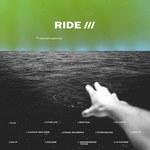
Ride This is Not a Safe Place
(Wichita)
Of the “Big Three” shoegaze acts (the other two being My Bloody Valentine and Slowdive), I’ve always found Ride the most fun to listen to—which is fitting considering their name. Their earliest two LPs, both landmark records of the 1990s and the latter of which, 1992’s Going Blank Again, I openly adore, really do sound like the most exhilarating carnival attractions you never got to experience because they didn’t meet the already questionable safety regulations of traveling circuses. Cuts like Seagull, Dreams Burn Down, and Vapour Trail off of the band’s debut, Nowhere, and Leave Them All Behind, Twisterella, Chrome Waves, Mouse Trap, Time of Her Time, and transcendent closer OX4 from Going Blank remain endlessly fun to play loud. I would go so far as to call Ride’s sophomore album one of the best rock records of the ‘90s.
The point being that Ride are a very influential band, though they haven’t been the most consistent. After Going Blank Again, there was a noticeable decline in the quality of their output. First came Carnival of Light in 1994, a record I have an odd affection for personally, but one that also was the first to show a massive chink in Andy Bell and Mark Gardener’s songwriting armor. And then came Tarantula in 1996—an album universally considered to be the worst in the band’s catalog—a bitter testament to the bad blood present in the group before their initial break-up, and a shameful throwaway into the monolithic pile of forgettable mid-nineties alternative rock CDs. Needless to say, they’ve had a tumultuous career. How does their post-reunion material fare nearly two decades later?
For one, I mildly enjoyed the group’s comeback album, Weather Diaries (2017). Part of that just comes from my own musical bias: it was produced by Erol Alkan, a DJ whose work I’ve always admired and who no doubt has had a hand in the more electronic direction Ride’s sound has taken. But I’d be kidding myself if I tried to act like I returned to that LP anywhere near as much as I’ve listened to Nowhere or Going Blank over the years. And after digesting Ride’s latest effort, This Is Not a Safe Place, also produced by Alkan, I’m inclined to put it in the same arena.
The interesting thing about these two 21st-century releases from Ride is that they are undeniably better than Tarantula and even Carnival of Light on a level of pure listenability. On Safe Place, Future Love alone smokes everything on Tarantula for breakfast—and features one of the lushest guitar riffs I’ve heard in 2019 thus far. I love the dreamy, autumnal tone of this song, and I also enjoy the synth splashes and uptempo melody of its follow-up in the tracklist, Repetition.
But unfortunately, it isn’t long before I start becoming more bored than I should be when listening to a Ride album. By the time the album’s mid-point lull is in full effect with tracks six and seven, Eternal Recurrence and Fifteen Minutes, respectively, I’m left throwing my hands in the air. So many of these songs could have easily been trimmed down or cut to the floor entirely, as Safe Place’s runtime is fifteen minutes too long. On Dial Up, Gardener sings, “It’s like my brain’s on dial-up.” Well, there are times where it seems like this album is on dial-up.
I hate to sound as if I completely dislike this record, because I don’t. Ride’s legacy is still solidified in the realm of indie rock, and I think the nine-minute closing track In This Room is proof that they still have a great ear for immersion. I like that song not just on a sonic level, but also because it harkens back to the nostalgic meanderings of a track like OX4. But sadly, the difference here in 2019 is that reaching the end of This Is Not a Safe Place—listening to the whole album—is not as rewarding as it needed to be.
4 September, 2019 - 04:16 — Jackson Glassey